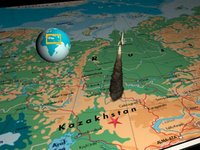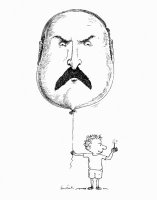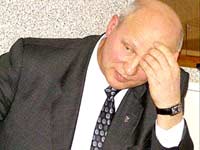 If society bans murder, how can society itself commit murder? By which morality does a state justify and perform murder of its own citizens? Is the state somehow part of a higher ethical stratum, where it deems itself the right to take life for life, an eye for an eye, a tooth for a tooth? No, this is contrary to the basics of European norms and values - to what we are as a civilised society. Still, to this very day, one single country in Europe actively exercises - what it believes to be - its right to deprive humans of their lives, namely Belarus.
If society bans murder, how can society itself commit murder? By which morality does a state justify and perform murder of its own citizens? Is the state somehow part of a higher ethical stratum, where it deems itself the right to take life for life, an eye for an eye, a tooth for a tooth? No, this is contrary to the basics of European norms and values - to what we are as a civilised society. Still, to this very day, one single country in Europe actively exercises - what it believes to be - its right to deprive humans of their lives, namely Belarus.A few days ago,
Amnesty International published its annual
report on the death penalty and executions in the world, stating that "Belarus is the last country in Europe and in the former Soviet Union that still carries out executions." At the same time, the European Union is easing the pressure on the authoritarian Lukashenko regime in Belarus, in an attempt at extracting relations with Minsk from the dead end of sanctions' and isolationary policies. The EU has thus e.g. lifted the ban on international travel for the regime's leadership.
As much as such EU-ouvertures may be wise - realising the failure of isolationism - a change of

policy towards Belarus demands careful reassessment and consideration of what is to be achieved and to what price. It is not enough to say that policy must change for the sake of change, if such change cannot create true change. Above all, however, we as Europeans, whether of Western or Eastern origin, must take a stand on which fundamental norms and values are inalienable, and which we are prepared to compromise with. This is to pose a few fundamental questions.
What is it to be European today? Arguably, the key common denominator for European statehood today is the abolition of the death penalty. It is a moral basis of the post Cold War European order, the logical consequence of the Helsinki process, the Council of Europe (CoE) and European overall integration.
This was clearly understood already by Gorbachev in the late 1980s, and was part of his common European home. Realising that the death penalty was incompatible with being a member of the European family, also Yeltsin's Russia took steps towards abolishing capital punishment, despite widespread public resistance. As part of its CoE accession process, Moscow accepted the proviso of the European Convention on Human Rights (ECHR prot. no. 6) to abolish the death penalty, and implemented a moratorium on executions, which has been upheld to this very day. In the 1993 Russian constitution, the intention to abolish the death penalty was clearly stated (art. 20). Although Russia has not yet abolished the death penalty, the normative value of not carrying out executions has so far been powerful enough for the country not to reconsider this position.
The founding fathers of American democracy held the right to life and the pursuit of happiness to be inalienable out of religious and ideological conviction. To the perspectives of rationality and enlightenment they added the intrinsicality of fundamental rights and freedoms, thus reaffirming the achievements of the French revolution. The US bill of rights prohibits government from depriving any person of life, liberty, or property, without due process of law. Some three scores hundred years later, Europe - in contrast to America - has reached as far as realising the right to life for its citizens to its full measure, without the restriction of legally sanctioned capital punishment. It is a powerful statement that the state is not more than its citizens - a government of the people, by the people, for the people. Why is it so?
As life, death is also a constant companion to human existence. Througho

ut human history, society has condoned itself to killing its own citizens for the sake of social order and cohesion, as punishment for crimes spanning from murder to petty theft, despite such basic norms and mottos as "thou shalt not kill." Respect for human life has varied, but still gradually progressed towards realising a ban on state executions. The utilitarian approach - societal homicide out of convenience - has given way to the fundamental right of human life. Such progress has demanded courage and conviction of our political leaders in their belief in the sanctity of life, also when it comes to the rights of the individual in relation to society and state.
As the European Union is now engaging in dialogue with the Lukashenko regime in Minsk, leadership is needed also in this respect. That four executions were carried through in Belarus only in 2008, should serve as a memento to European leaders as for which kind of regime they are dealing with, namely the only remaining European state that sees it fit to take the lifes of its own citizens, for whatever reasons there may be. Not having this constantly in mind is to tread a slippery slope in relation to the fundamental norms and values that make up the Europe that we have come to know and cherish.
A few years back, the opposition in Belarus carried placards with the motto "Kill your inner Lukashenko!" As much as killing seems inappropriate to the arguments held forth here - a call

for caution when dealing with the last European state implementing the death penalty - it has a lot to say about the mental and intellectual process within each and everyone of us in reaching the conviction that capital punishment is contrary to our most basic values. The soviet liberal and founder of
Memorial, Aleksandr Yakovlev, often used to say of Stalinist crimes that "the guilty are in hell, and among ourselves. --- Evil will not pass away before we acknowledge that we are sick ourselves." Thus, killing one's inner Lukashenko refers as much to acknowledging that one - as an individual - is part of the overall societal malaise of an authoritarian regime. A true change for the better can only come about as a result of individual and societal mental progress. This is as true when it comes to abolition of the death penalty, as to human rights and democratisation.
As leaders of the European Union now set forth to talk to the tyrant, their recipe should be a mixture of courage and humility in the realisation that they also carry the seeds of good and evil within themselves. Still, goodness and grace stand victorious in the guise of the common European identity, epitomised by the norms and values of fundamental rights and freedoms, and must also be the very basis of any current or future dialogue with the Lukashenko regime in Belarus. Any other way would be a betrayal to what we as Europeans are and what we stand for. We simply cannot embrace societies that condone murder of their own citizens as members of our European family, no matter how convenient this might seem. In Belarus, attaining fundamental rights and freedoms means fundamental change. If Europe and its leaders do not

realise this, Belarus might prove a watershed also for Europe in the constant choice between good and evil.
























